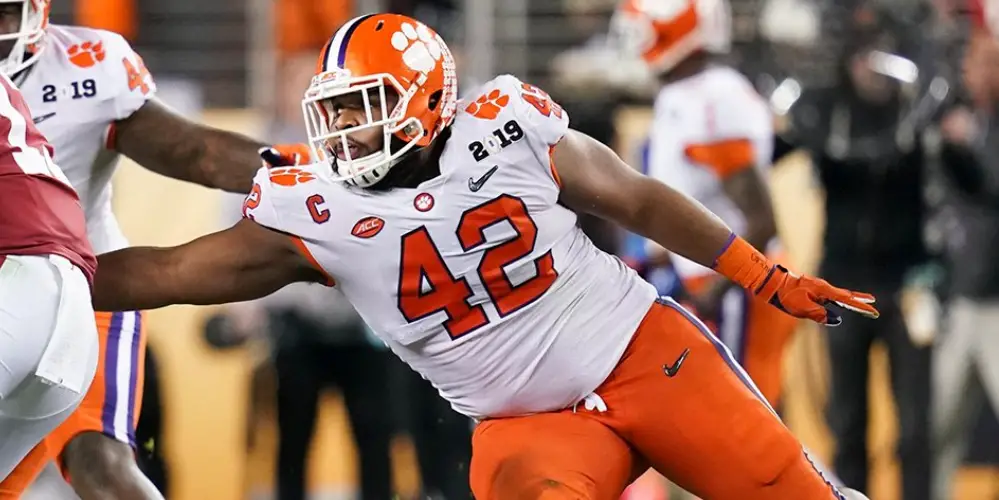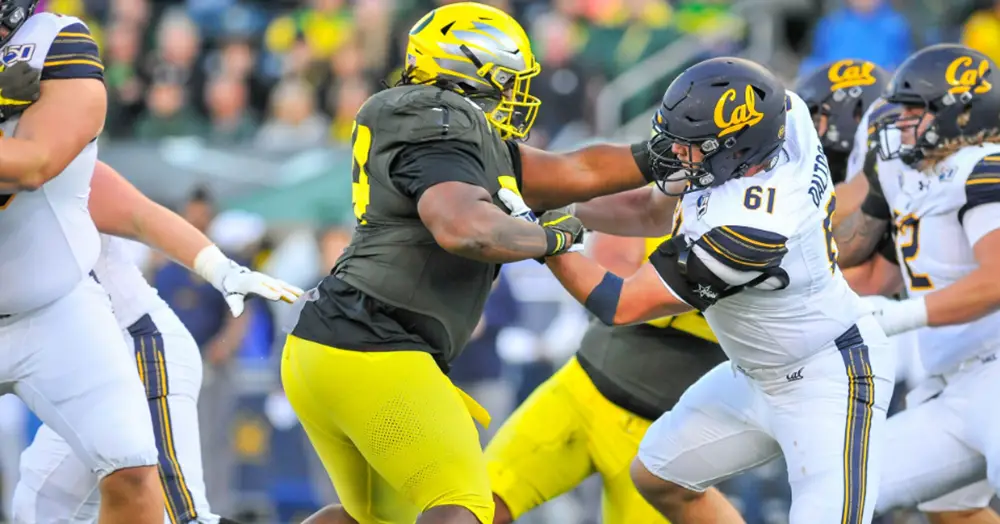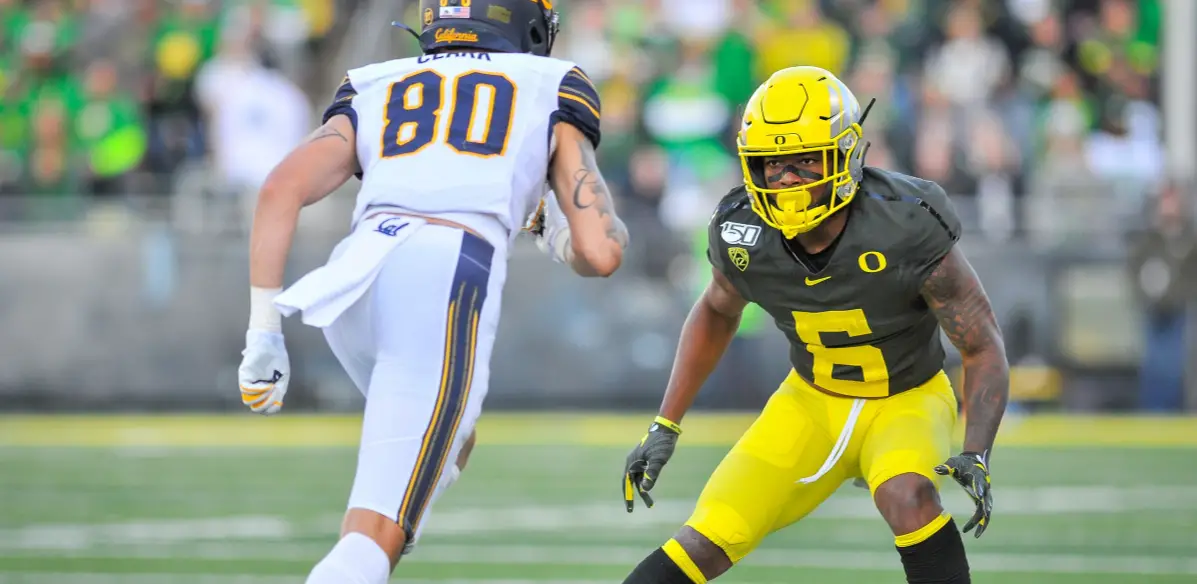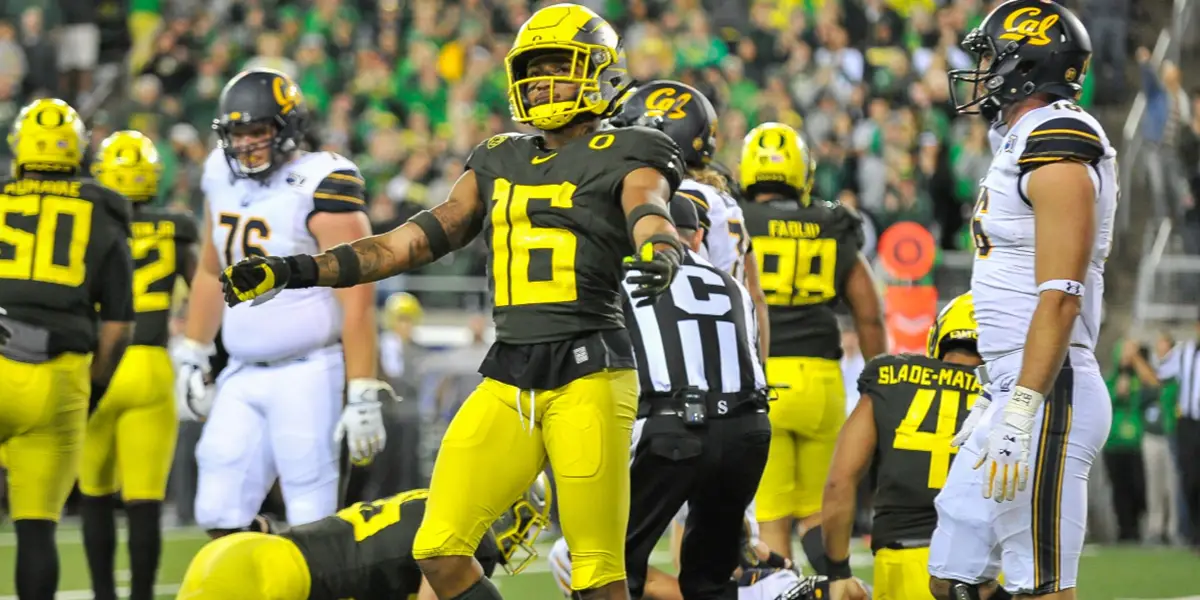The transformation of Oregon Football under Mario Cristobal is in full swing. The days of scoring 40 points a game are officially over, as it’s clear his strategy is to grind out hard-fought wins by using his team’s size and strength advantage.
For Oregon fans who grew accustomed to high point totals and exciting offensive highlights, this new style is quite the change of pace. But this transformation might be for the better. For the first time in forever, Oregon has an elite defense.
Cristobal has taken his lumps for fielding an offense that barely resembles the high-flying unit that dominated the Pac-12 under Chip Kelly and Mark Helfrich. But, as we’ve seen time and time again, an elite offense cannot carry a team to a championship without an elite defense backing it up. Are these Ducks better positioned for a title now that they have one of the best defenses in college football?
Does Defense Really Win Championships?
“Defense wins championships” is the oldest football cliché in the book. Football purists preach this sentiment ad nauseam, clinging to the idea that as long as a team has an elite defense, it has a legitimate chance to win it all.
The thing is, they’re right.
Not only does having an elite defense give a team a good shot at winning a national title, it’s nearly impossible to win a championship without one. Since 2010, only one team has won a national championship without a defense ranked in the top 25 of Bill Connelly’s S&P+ rankings: the Auburn Tigers in 2010. And even in the Tigers’ victory over Oregon in the 2011 National Championship Game, Auburn’s defense carried the team, stifling the explosive Oregon offense, holding it to well under its scoring average.

Clemson’s dominant defense helped them to win two championships.
Every title-winning team since then has had an elite defense, with all but the 2014 Ohio State Buckeyes ranking in the top 10. What people forget about Clemson’s thrilling wins over Alabama in the 2017 and 2019 National Championship Games are that the Tigers were bolstered by dominant, top-10 defenses in both seasons. People remember Jameis Winston’s heroics against Auburn, but if it hadn’t been for Florida State’s second-ranked defense, the Seminoles wouldn’t have even made it to the title game.
The correlation between having a top-level defense and winning national championships is too strong to dismiss as coincidence. If there’s a side of the ball that needs to be elite to win a title, it’s defense.
Oregon’s Defense Is Championship Caliber
Oregon has had some solid defenses in the past. Former defensive coordinator Nick Aliotti did about as well as he could during his time in Eugene, especially since the blistering pace of the Ducks’ offense kept his defense on the field most of the time. But Aliotti’s defenses were never elite. If the early 2010s Ducks had a weakness, it was their often-porous defense.
In games where Oregon’s offense was shut down, its defense wasn’t built to shoulder the load and take over games. When the Ducks lost, it was usually because teams with ball-control offenses such as Stanford, Ohio State and Auburn were able to control the pace of the game and keep the Oregon offense off the field.
Now, Oregon is the grinder.

It’s hard to run against Jordon Scott and the Ducks.
The Ducks’ defense is absolutely smothering, holding opponents to fewer than 10 points and 270 yards per game. Both of those stats rank in the top 10 nationwide — a sight for sore eyes, as typically the Ducks have ranked in the bottom half of the country in these statistics.
New defensive coordinator Andy Avalos has his defense playing with its hair on fire every snap. The unit has made life miserable for opposing offenses, with crafty blitzes, frequent pre-snap shifts, stunting and slanting on the defensive line, and a disciplined, fundamentally sound approach.
It’s a challenge to run against the Ducks, as backs will find big nose tackle Jordon Scott waiting for them right at the line of scrimmage, along with hard-hitting linebackers Troy Dye and Isaac Slade-Matautia.
Passing against them is even harder. Shutdown cornerbacks Deommodore Lenoir and Thomas Graham Jr. are blanketing opposing receivers. And if teams dare to test the middle of the secondary, safety Jevon Holland, perhaps the best ball hawk in the country, will be waiting.
Oregon’s defense is special, and it’s on pace to be the best in school history. The combination of blue-chip talent and elite scheming and coaching gives the Ducks one of the most dominant defenses in all of college football.
However, Elite Defenses Don’t Win Championships on Their Own
Oregon’s emphasis on defense puts the program in a great spot moving forward. This season, the Ducks are far and away the favorites to win the Pac-12 now that Washington has suffered its second conference loss. And if they are able to retain Avalos and continue to recruit well, there’s no reason their status as conference front-runners will change any time soon.
But, while winning the Pac-12 can be accomplished solely on the shoulders of an elite defense, winning a national championship is a different story. Oregon is prioritizing things correctly; having a great defense is the most important step in building a championship contender. But it’s not the only part.

Oregon needs more than an elite defense to win a national championship.
Most championship-winning teams since 2010 had legitimate top-10 defenses, but most of them also had effective offenses to match. Clemson wouldn’t have won either of its titles without blue-chip quarterbacks Deshaun Watson and Trevor Lawrence. In the 2015 playoff, Ohio State wouldn’t have even made it past the semi-finals if it hadn’t been for an explosive offense, led by Cardale Jones, Devin Smith and Ezekiel Elliott. And without an offensive spark from backup quarterback Tua Tagovailoa, Alabama wouldn’t have its national championship victory over Georgia.
Defenses don’t win championships exclusively. Otherwise, Michigan, Michigan State, Stanford, Washington and other schools that have had elite defenses would have won it all by now. While establishing an elite defense should always be the goal, that defense needs to be complemented by a capable offense in order to win a championship.
Now that they have a championship-caliber defense, the Ducks are halfway there. Now, they have to go back to their roots and work out the kinks on offense, so that their defense has some breathing room in case it has an off game. With the defense it now has, Oregon won’t have to score 40 points a game to win a title.
But it’ll have to score more than the 17 it did against Cal.
Joshua Whitted
Morgantown, West VirginiaTop Photo by Kevin Cline
 Bob Rodes, the FishDuck.com Volunteer editor for this article, is an IT analyst, software developer and amateur classical pianist in Manchester, Tennessee.
Bob Rodes, the FishDuck.com Volunteer editor for this article, is an IT analyst, software developer and amateur classical pianist in Manchester, Tennessee.
Joshua is an adopted Duck fanatic, originally hailing from southwestern Pennsylvania. His love for the University of Oregon began as a young child when he became mesmerized by the flashy uniforms and explosive offenses of the Chip Kelly era, and now, he follows the team religiously. His fondest memory of the team is seeing De’Anthony Thomas race past Wisconsin defenders back in the 2012 Rose Bowl. A true football enthusiast, Joshua loves studying the intricacies of the game, and he aspires to become a professional sports journalist. Joshua now resides in Morgantown, West Virginia where he works in customer service. When he’s not watching Oregon replays, Joshua loves reading, writing, and spending time with his family. Contact: whittedjd@gmail.com

